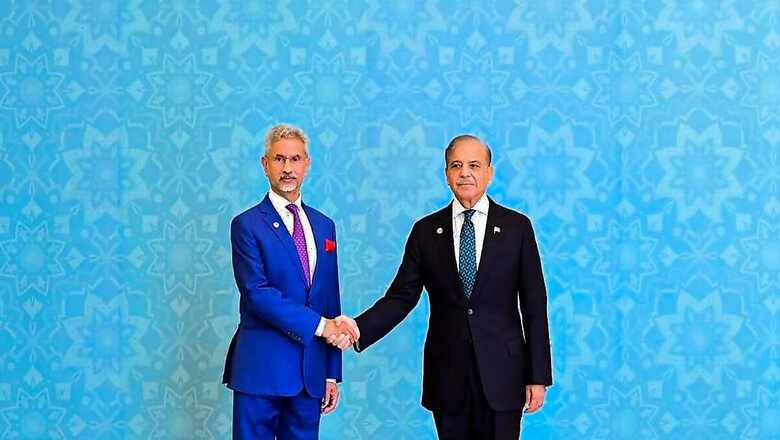
views
No Fireworks, But That’s a Win
There were no fireworks at the SCO. It was uneventful. And in the context of Pakistan, that’s a good thing. Surprisingly, Islamabad pulled off the SCO summit without a single security incident—no bomb blasts, no terror attacks and no street protests. In a country that has faced recent terror strikes, including in Karachi, this was an extraordinary feat. And this was made possible by essentially putting the entire capital on lockdown.
Jaishankar’s Stern Message: No Bilaterals, No Ambiguity
This was the first time an Indian foreign minister was visiting Pakistan in nine years. Jaishankar’s stance was clear from the outset: this was an SCO event, not an India-Pakistan bilateral engagement. He drew firm boundaries well before he arrived in Pakistan. There were no bilateral meetings scheduled or even hinted at, and Jaishankar made it clear through both words and actions that India’s presence in Islamabad was about the SCO, not about thawing ties with Pakistan.
With confident body language and meticulous composure, he represented India’s position perfectly—that this visit should not be misconstrued as a thaw in ties, that ties with Pakistan would remain cold as long as cross-border terrorism continues to be a reality and that India would be respectful of the host nation in a show of grace— something Pakistan’s then Foreign Minister, Bilawal Bhutto, failed to do when he was in India for an SCO meeting in 2023.
In his speech, EAM Jaishankar offered a veiled yet powerful critique, stating, “If trust is lacking or cooperation inadequate, if friendship has fallen short and good neighbourliness is missing somewhere, there are surely reasons to introspect and causes to address.” This was a direct, albeit diplomatic, indictment of Pakistan’s role in fostering terrorism. He further reinforced this by stressing that activities “across borders characterised by terrorism, extremism, and separatism” would hinder regional cooperation on key issues like trade, energy, and connectivity.
By attending the event, Jaishankar avoided giving Pakistan an excuse to claim that India was avoiding dialogue or engagement. But he also used the forum to directly call out Pakistan’s role in promoting terrorism—on Pakistani soil, no less.
At the same time, the EAM’s presence ensured that India continue to engage with Central Asia, using the SCO as a platform to deepen ties with countries like Kazakhstan, Tajikistan, Kyrgyzstan, and Uzbekistan. Central Asia remains a key region for India’s strategic interests, particularly in energy, trade, and connectivity. However, the region is also heavily influenced by China, whose Belt and Road Initiative (BRI) has provided massive infrastructure funding to these countries. India’s presence in the SCO helps to counterbalance China’s dominance in the region, even as it works to build more robust ties with these nations.
The China-Pakistan Challenge: Why India Stays in the SCO
One might ask, why does India continue to participate in a group where two of its key adversaries—China and Pakistan—wield significant influence? The answer lies in India’s broader strategic calculus.
The SCO began as a regional platform to promote trade and security, and has grown into a significant platform connecting India to Central Asia, Russia, and even adversaries like China and Pakistan. With new members like Iran, and Belarus as the tenth member of the group, the SCO represents about 40 per cent of the world’s population and 30 per cent of global GDP.
The SCO is not just a China-Pakistan-dominated bloc; it also includes Russia, a long-standing Indian ally, and four important Central Asian Republics (CARs) that are crucial to India’s regional outreach.
India’s role in the SCO allows it to challenge the growing influence of China and Pakistan within the organisation. China has been pushing to turn the SCO into a forum that counters Western influence globally, and Pakistan is more than willing to play along. The two all-weather allies consistently engage in border aggression against India while pretending to be the region’s custodians. India’s presence ensures that it can counter-narratives emerging from Beijing and Islamabad, especially on issues such as terrorism and regional security.
For instance, India continues to oppose China’s Belt and Road Initiative within the SCO framework, refusing to sign related documents during the summit. India’s decision not to endorse the BRI is rooted in concerns about sovereignty, particularly because one of the major BRI projects, the China-Pakistan Economic Corridor (CPEC), runs through Pakistan-occupied Kashmir, in violation of Indian territorial integrity.
Strengthening Ties with Russia and Central Asia
The SCO is also a vital forum for India’s engagement with Russia, a key strategic partner. With the Ukraine conflict reshaping global alliances, India’s ties with Russia remain crucial, even as Moscow’s relations with Beijing deepen. The SCO allows India to maintain a working relationship with Russia within a multilateral framework, ensuring that its strategic autonomy remains intact. India’s presence also helps Russia by preventing the group from becoming a wholly China-centric one.
Moreover, India’s role in the SCO is vital for its efforts to build stronger ties with Central Asia, a region rich in energy resources and strategically located between Russia, China, and the Middle East. However, one of India’s major challenges in this region is connectivity—both China and Pakistan have used their geographic position to dominate trade routes into Central Asia. India’s presence in the SCO allows it to push for greater regional connectivity, explore creative solutions to bypass these challenges, and expand its footprint in the region’s markets.
Hitting Two Targets with One Visit
To conclude, Jaishankar’s SCO visit to Pakistan hit two birds with one stone—engaging with Central Asia, and confronting both Pakistan and China.
His visit to Islamabad, despite strained India-Pakistan ties, reflects India’s strategy of maintaining SCO as a key platform for engaging Central Asian countries. India also seeks to be a conscience-keeper of the group by not skipping Pakistan and instead being present there to call out cross-border terrorism. India’s presence allows it to challenge narratives on security issues directly, especially those emanating from China and Pakistan. By engaging with the group, India keeps its enemies close while combating narratives and initiatives that are detrimental to India’s interests.
Views expressed in the above piece are personal and solely those of the author. They do not necessarily reflect News18’s views.

















Comments
0 comment